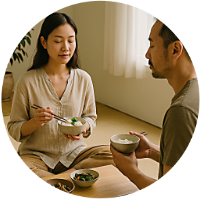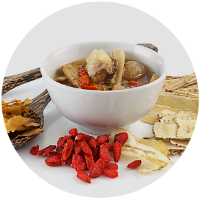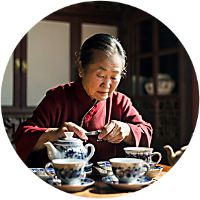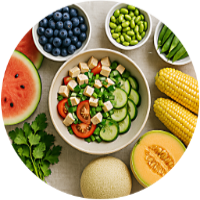Eating for Summer:
Staying Cool Without Weakening Digestion
In traditional Chinese medicine (TCM), summer is the season of Fire—associated with the Heart, the Small Intestine, and the outward expression of joy. It’s a time of growth, movement, and social activity. But the same fire that brings vitality can also overheat the system, especially if we’re not mindful of what we eat and drink. TCM encourages seasonal eating not through hard rules, but through balance. In summer, this means cooling the body without damaging the digestion.
 One of the first instincts in hot weather is to reach for cold drinks and raw foods. And while that can feel satisfying in the moment, TCM offers a more nuanced view. Cold foods and drinks may temporarily reduce body temperature, but they also inhibit the Spleen and Stomach Qi—the very organs responsible for transforming food into energy. If these become weakened, we may experience bloating, fatigue, loose stools, or even poor appetite, which ironically can worsen the heat by impairing the body’s natural cooling mechanisms.
One of the first instincts in hot weather is to reach for cold drinks and raw foods. And while that can feel satisfying in the moment, TCM offers a more nuanced view. Cold foods and drinks may temporarily reduce body temperature, but they also inhibit the Spleen and Stomach Qi—the very organs responsible for transforming food into energy. If these become weakened, we may experience bloating, fatigue, loose stools, or even poor appetite, which ironically can worsen the heat by impairing the body’s natural cooling mechanisms.
Instead of iced drinks, opt for room temperature water or cooling teas like chrysanthemum or mint. These herbs help clear internal heat without chilling the digestion. Instead of large salads or smoothies, favor lightly cooked vegetables—steamed, blanched, or stir-fried. Foods that grow in summer naturally support the season’s needs: cucumbers, bitter melon, mung beans, watermelon, tomato, and winter melon are all considered cooling in nature. Use them alongside warming foods like garlic, ginger, or scallion to create gentle balance.
TCM also emphasizes the importance of avoiding greasy, overly spicy, or heavy foods in summer. These can lead to internal heat or damp-heat, which may show up as acne, irritability, a sticky tongue coating, or digestive discomfort. Instead, meals should be light, fresh, and frequent. Soups are ideal—not only hydrating but also easy to digest. A classic is mung bean soup, lightly sweetened and served lukewarm, which clears heat and supports detoxification.
Emotionally, summer is tied to the heart and its role in housing the Shen (神), or spirit. Overheating can lead to restlessness, insomnia, or feeling scattered. Gentle foods that nourish fluids—like lotus seed, lily bulb, or goji berry—can help anchor the spirit while still supporting seasonal energy.
Above all, summer is a time to be flexible and responsive. On especially hot days, cooling foods and more water may be appropriate. On cooler or rainy days, a little ginger or warm porridge might be better. Listening to the body, rather than forcing trends or routines, is at the heart of Yangsheng (养生)—nourishing life through harmony with nature.
Vocabulary Guide
qi (气) – vital energy, central to digestion and circulation in TCM
spleen qi (脾气 píqì) – the energetic function of the spleen system, responsible for digestion and transformation
shen (神) – spirit or consciousness, housed in the heart
yangsheng (养生) – the art of nurturing life and maintaining health through daily living
damp-heat (湿热 shīrè) – an internal condition caused by rich or heavy food, resulting in inflammation or sluggishness







